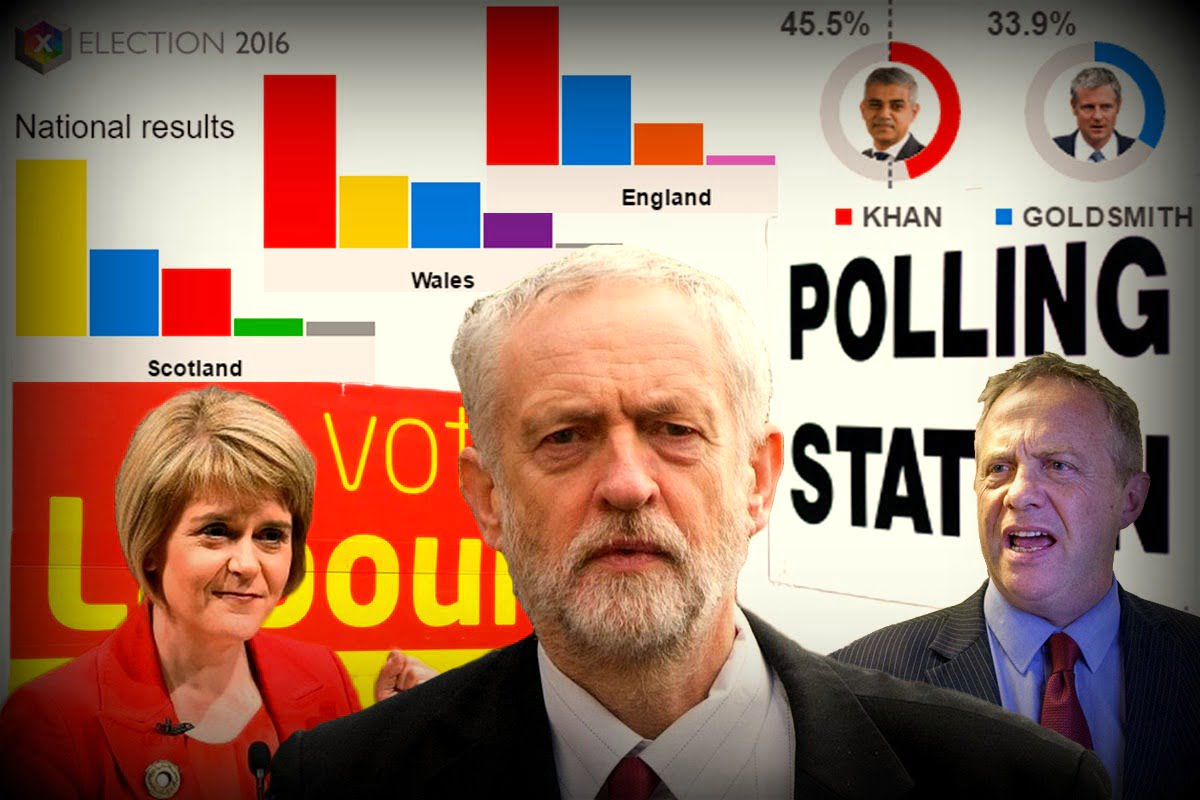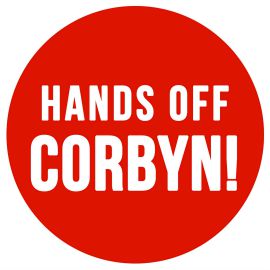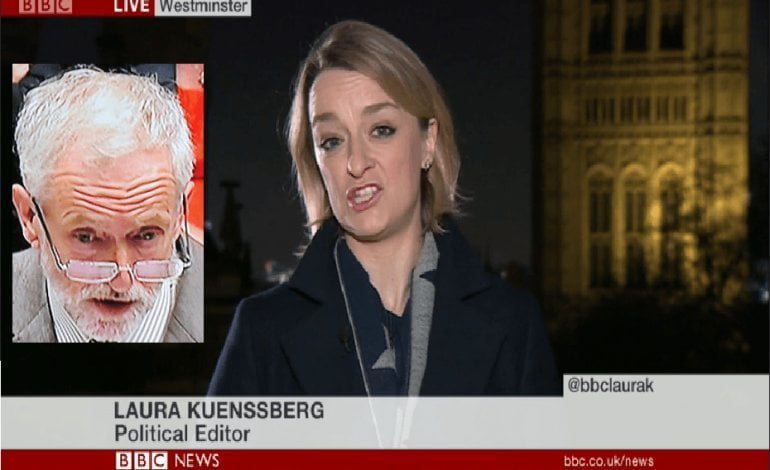Ever since winning the election for the Labour leadership last September, Jeremy Corbyn has faced an onslaught of attacks by the mainstream media. This vitriolic coverage intensified in the run up to the recent elections. As a result, even the BBC is now rightly seen for being a tool and voice of the Establishment, as their mask of “neutrality” and “impartiality” rapidly slips.
Anyone who in general believed the news before the recent elections would have been in for a shock on the 6th May. Rather than the catastrophic defeat predicted for Labour, the reality was that the Labour Party received by far the most votes cast (38.5%), as against 27.1% for the Tories. Rather than lose “175 seats”, as predicted by a variety of out-of-touch commentators and so-called political “experts”, Labour in fact only lost 11 in England, 1 in Wales, 13 in Scotland and held onto all its councils. This was in spite of a concerted and coordinated media campaign, which sought to paint a picture of Labour as a party of chaos, riddled with anti-Semitism, and heading for crisis.
What of the coverage of the Tories, a party known to be full from top to bottom with genuine racists, which is in deep disarray over Europe and is heading towards a split? From the mainstream media’s reporting, you could be forgiven for thinking that they were on a smooth path to victory. The reality was that the Tories lost 49 seats in England, 3 in Wales, and the London mayoral election by a massive margin. Only in Scotland did the Tories gain.
Impending defeat
Corbyn’s enemies from across the Establishment wasted no breath in denouncing the impending catastrophe for the Labour Party. One “expert” after another lined up to give spectacular predictions of how badly the party would fare, with Corbyn of course to blame. Of course, no evidence was provided for any of these assertions. But, then again, why let the facts get in the way of a good story?
“Jeremy Corbyn on course to lead Labour to its worst council elections in more than 30 years” (Daily Mail, 25 April 2016)
“Labour set for worst council defeat in opposition in 34 years” (The Telegraph, 25 April 2016)
“Labour Crisis: Polls Predict Massive Party Losses” (Newsweek, 02 May 2016)
“…new projection conducted for the Guardian shows that Labour is on course to lose 175 council seats in Thursday’s elections” (The Guardian, 02 May 2016)
The doom-and-gloom merchants were provided with as much press space as they could ask for – and more. Anyone prepared to attack Corbyn was given free rein to air their thoughts on the nation’s (that is, the Establishment’s) print media and airwaves. When the predicted electoral disaster failed to materialise, impossible targets set by the Blairites were echoed throughout the press, in order to present the actual results as a defeat:
“Both Liz Kendall, a former leadership contender, and Michael Dugher the former shadow culture secretary, also said the party must gain 400 seats to show it is on track to win the general election in 2020.” (The Telegraph, 04 May 2016)
Self-harm
The hue and cry over Labour’s supposed “anti-Semitism problem” was particularly outrageous. Clearly timed and orchestrated by Blairites, such as John Mann MP, to cause maximum damage to Labour in the elections, the allegations were undoubtedly a political attack against the left wing in the party.
By attempting to paint the party as racist, the right wing were hoping that Labour would suffer a severe defeat in the election. This would then be used as a pretext to oust Corbyn at the earliest opportunity, allowing these Tory wolves in sheep’s clothing to regain control over the party.
Unfortunately for the Blairites, however, events did not follow their script. The right wing in the party will now have to bide their time and wait for another opportunity to mount a coup against the left-wing Labour leader. In the meantime, the sabotage and smears against Corbyn will doubtless continue.
These Blairite careerists and carpetbaggers must be firmly told to either shut up or get out. If they refuse to support the democratically elected leader and his programme, then Labour members should exercise their democratic right to replace these MPs with representatives who will.
Heads I win; tails you lose
 Despite the barrage of attacks against Corbyn and Labour, the electoral apocalypse predicted by the Labour right wingers and the mainstream media was not reflected in the reality of the results. Instead, the Labour Party actually strengthened its position compared to its results at the 2015 general election and came out as the strongest party nationally. Nevertheless, the media howled in chorus about the “disaster for Corbyn” and focussed heavily on the “meltdown in Scotland”, largely ignoring – for example – the massive swing to Labour in London.
Despite the barrage of attacks against Corbyn and Labour, the electoral apocalypse predicted by the Labour right wingers and the mainstream media was not reflected in the reality of the results. Instead, the Labour Party actually strengthened its position compared to its results at the 2015 general election and came out as the strongest party nationally. Nevertheless, the media howled in chorus about the “disaster for Corbyn” and focussed heavily on the “meltdown in Scotland”, largely ignoring – for example – the massive swing to Labour in London.
Indeed, it was precisely because of Corbyn that Labour did not suffer a crushing defeat. Had Liz Kendall, Yvette Cooper, or Andy Burnham led the party, there really would not have been much of a positive reason to vote Labour. In fact, rather than voting for Labour councillors, many of whom are seen as complicit in carrying out Tory austerity locally, many voters were in fact voting Labour for Corbyn.
Media exposed
The role of the media in lining up to attack Corbyn has been plain for all to see. In particular, the part played by the BBC in these events has incensed thousands of ordinary people who previously believed in the “impartiality” of the broadcaster.
So anti-Corbyn was the BBC’s election coverage that a petition on 38 Degrees calling for Laura Kuenssberg, the political editor of the BBC, to be sacked attracted 35,000 signatures in days.
This enormous anger towards the BBC’s bias comes on the back of months of attacks by Keunssberg against Corbyn, since her appointment as political editor in July 2015. As a result, rather than being seen as a “neutral” and “impartial” political commentator, Keunssberg is now widely – and rightly – regarded as being a Tory activist on the payroll of the BBC.
Prior to the recent elections, Keunssberg previously caused outrage when she and Daily Politics presenter Andrew Neil planned for right-wing Labour MP Stephen Doughty to resign live on air, minutes before Corbyn was to appear on Prime Minister’s Questions.
Establishment pressure
Within days of it going live, 38 Degrees took down the petition on the spurious grounds that the petition had been “hijacked” and was being used as a “launch pad for sexist hate speech”. This story was repeated by the Guardian, the New Statesman, the BBC, and even David Cameron in the House of Commons – the clear intention being to divert anger away from the BBC itself by smearing Corbyn’s supporters as sexist trolls.
However, a leak of the comments on the petition, reviewed by The Canary, found only one sexist remark, in addition to one sexist post on Twitter. This prompted former UK ambassador Craig Murray – himself an experienced member of the Establishment – to suggest that the petition was removed under “establishment pressure”.
Veneer of impartiality
So relentless are the BBC’s attacks against Corbyn that even the former BBC Trust Chairman has stepped in to criticise its recent coverage. Sir Michael Lyons, chairman of the trust from 2007 to 2011, stated:
“There have been some quite extraordinary attacks on the elected leader of the Labour Party. I mean quite extraordinary – I can understand why people are worried about some of the most senior editorial voices having lost their impartiality on this.”
In reality, by airing such “concerns”, Sir Michael is giving a warning to the current BBC executives that, unless they rein in their attacks, the BBC’s real role in society will be exposed plainly for all to see – that of providing ideological support and justification for the Tories, the wider Establishment, and their interests. By overstepping the mark with their coverage against Corbyn, the BBC is wiping away the thin veneer of “impartiality” that is one of the best covers for the propaganda of the ruling class.
Toe the line
With the recent 90th anniversary of the General Strike in Britain, it is useful to remember that during the strike Winston Churchill, who was then in charge of the government propaganda paper the British Gazette, argued that the BBC should be directly incorporated into the state, so as to better toe the government line on the airwaves.
Stanley Baldwin, the Tory Prime Minister, argued against this on the basis that the BBC would play a more effective role for the government if it was seen to be independent. Indeed John Reith, the Director-General of the BBC at the time of the strike, commented in his diary: “The cabinet want to be able to say they did not commandeer us, but they know they can trust us not to be really impartial”.
Such loyalty to the government and the Establishment was famously exposed during the Miners’ Strike of 1984-85, when the BBC faithfully joined the side of Thatcher against the miners. Its coverage of the “Battle of Orgreave”, where miners were first viciously set upon by the police, was edited so as to show the events in reverse – that is, to portray the “battle” as starting with an attack by the miners against the police, when in reality the miners were responding to a brutal assault by the forces of the state. Only in 1991 did the BBC admit to this falsification, claiming that the footage had been “inadvertently reversed”.
Media bias?
 As Marxists, we must be clear that in a society divided into irreconcilable classes there can be no such thing as an “impartial” press. Either the media will take the side of the exploiters and the oppressors – the 1%; the rich elite who own the means of production – or it can take the side of the vast majority; the workers, the youth, and the poor.
As Marxists, we must be clear that in a society divided into irreconcilable classes there can be no such thing as an “impartial” press. Either the media will take the side of the exploiters and the oppressors – the 1%; the rich elite who own the means of production – or it can take the side of the vast majority; the workers, the youth, and the poor.
In a society where the vast bulk of the media is owned and controlled by the same class that is attacking workers, slashing jobs, cutting wages, etc., with five billionaires owning 80% of the media, it is no surprise that this same media will put forward the news as to the benefit of the capitalists and the Establishment. There are varying degrees of subtlety as to how this is done. When members of the ruling class are criticising the media over its coverage of Corbyn, their message to the editors is intended as a warning; a call to be more careful – “do not expose our interests so obviously!”
Despite all the barrage of mudslinging and slander in the press directed against Corbyn and his supporters, it did not stop Labour from being the most popular of all the political parties in Britain in the recent elections. The press can say what they like, but if it does not match up with people’s experiences of daily life, then it will have limited effect.
Whilst the capitalist media attack Corbyn for standing up against austerity and corruption, more and more ordinary people are becoming increasingly disgusted with the Tories and those they represent – the bankers and super rich. As this anger grows, so does the bitterness towards those in the media who act as faithful apologists for the capitalists and their interests.
As the crisis of capitalism deepens, so too does the legitimacy of the capitalist media break down. Ultimately, no amount of press lies and distortions will be able to hold back a movement of the working class that is conscious of its aims and prepared to struggle against the inequalities and injustices of this rotten system.






